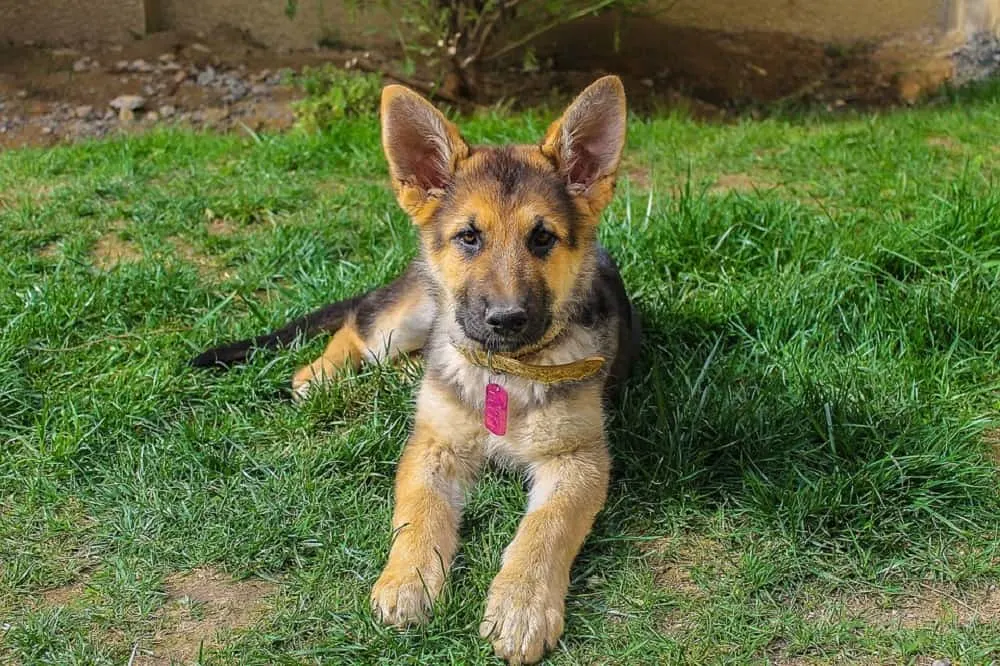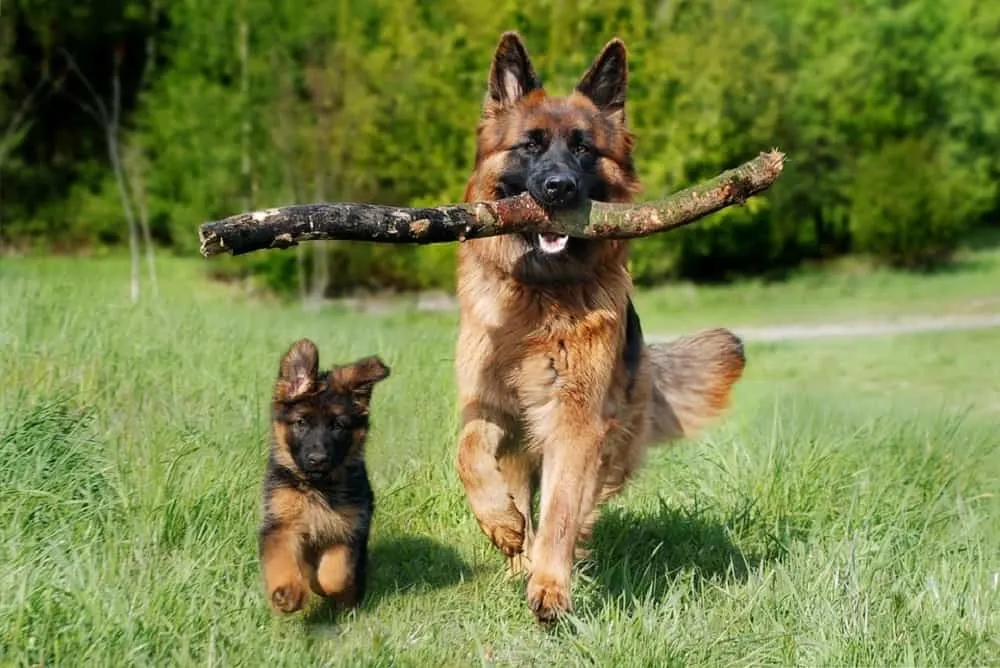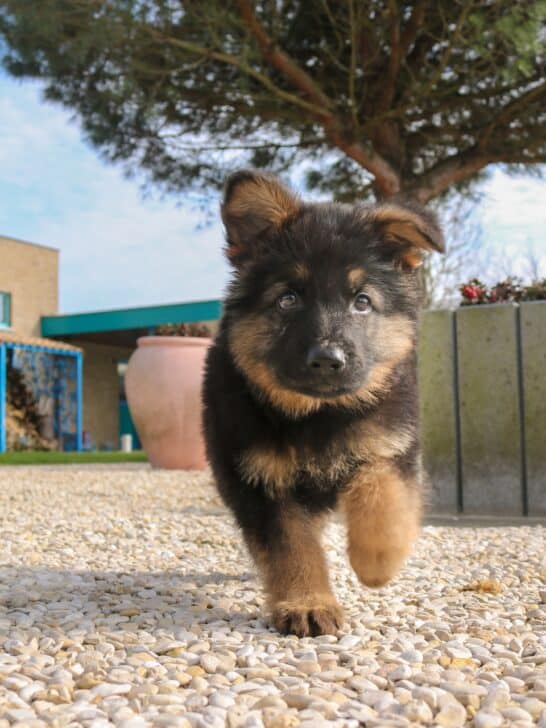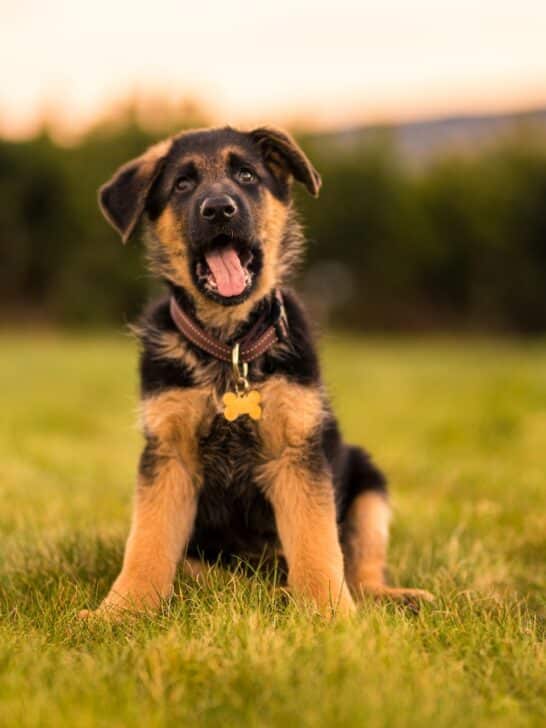Choosing The Right German Shepherd Puppy From A Litter
It can be a difficult decision when it comes to choosing the right German Shepherd puppy for you. An exciting decision, but a daunting one nonetheless!
It can be so hard to look at a whole litter of adorable puppies and only choose one. It would be so easy to just take them all home with you!
But chances are that you can only afford to take one of those gorgeous puppies home with you. So you will need to do your research and make sure that you choose the right dog for your home!
This will need to be done in a methodical manner so that you can find the right dog for you.
You may think that you’ll be better off choosing the biggest, healthiest dog that you can find from the litter.
And yes, there may be some truth in the fact that choosing a dog with a good physique as well as a beautiful coat can be an indicator of how well your puppy will thrive as an adult.

However, there are a couple of other factors you will need to consider before you make your final decision.
One of the most important factors to consider when choosing a German Shepherd puppy is what their personality and temperament are like.
German Shepherds are just like people. They each have their own personalities, and some are able to get along with other dogs better than others.
In fact, how your German Shepherd puppy interacts with other dogs and people will mostly come down to their individual personality.
If your new dog is motivated by the same things that you are, you’ll both be able to get on with one another better.
This will mean that your German Shepherd puppy will need less training, and a lot of your interactions with one another will come more naturally.
So your German Shepherd puppy’s characteristics will be more important than their physical appearance. The best puppy for your home may not be the biggest, prettiest dog in the litter!
How to get started
Before you can worry about choosing the best German Shepherd puppy for your home, you will need to find a breeder. It’s not just as simple as opting for the breeder who sells the cheapest dogs.
You will need to opt for a German Shepherd breeder who has a good reputation. So you will need to do your research to find the right breeder for your needs.
You won’t want to support any puppy mills, as these are very cruel to the animals.
You may even need to travel a fair way to find the perfect breeder. You shouldn’t choose your breeder based on how close they are to your location.
Even if your German Shepherd breeder is located several states away, it will be worth the trip.
It’s important to remember that adding a German Shepherd to your home is a lifelong commitment. If you put in the right amount of time and effort now, it should pay dividends throughout the next few years.
Here are a few handy tips to help you find the right breeder to buy a German Shepherd puppy from.
Talk to your German Shepherd breeder
One of the first things you should do is to give the German Shepherd breeder a call. You may be surprised to learn that quality breeders will actually require this to ensure that the puppy is going to a good home.
They won’t just let you turn up on their doorstep at short notice to buy whichever dog takes your fancy.
Questions they will ask you
If the breeder you’ve found doesn’t ask you any of these questions, this should give you a reason to pause.
They may not be as interested in the health of the puppy and their new home as they should be, and are more concerned about making a profit from their dogs.
1. What’s your home environment like?
The breeder will want to ensure that you have the right space to accommodate your German Shepherd puppy. They won’t want the puppy to be going to a cramped apartment where they can’t grow properly.
2. Have you got any kids?
Training your new puppy and giving them the right amount of socialization will be essential for keeping your family safe.
A scared dog that hasn’t been socialized very well is more likely to be scared of people, and will therefore be more likely to bite anyone they’re not used to.
3. Do you have a fenced outdoor space?
Your puppy will need to have a good amount of room so they can run around and play. They will need regular exercise to stay fit and healthy.
4. Why do you want a German Shepherd?
The breeder will want to know what purpose you want a German Shepherd puppy for. It could be as a pet, for added protection, or to show competitively.
This should help the breeder make a decision as to whether you’re the right fit for one of their dogs.
5. Do you have any other pets?
This will be an important factor as you will need to know how to introduce your new puppy to other animals. It will also be crucial to know if you have any other pets which could pose a danger to the puppy.
6. What do you do for a living?
If you have to work away for long periods of time so that your puppy is left alone for large portions of the day, the breeder will want to know this.
German shepherd puppies don’t do well on their own, so the breeder will want to make sure that they are having the right amount of time dedicated to them.
7. Can you afford the financial responsibility of this puppy?
Dogs are a financial commitment. This may seem like too much of a personal question, however, it will be important to establish that you can properly care for your new dog.

Questions you can ask your breeder
There are far too many unethical breeders around. So you should make sure to ask them the below questions to ensure that they have your dog’s best interests at heart.
If they are unable to answer these questions or come up with suspicious answers, it’s best to continue your search for a German Shepherd breeder elsewhere.
Some irresponsible breeders will take shortcuts when it comes to breeding, which will leave you with dogs who have behavioral and health issues.
1. Do you raise other breeds of dog?
If the breeder mentions that they also breed several other breeds, it’s best to stay away from them.
2. Can I meet the German Shepherd puppy’s parents?
You should be able to see the puppies’ parents before you commit to buying one. This can show you whether they have been bred from healthy dogs.
It’s also important to visit them more than once, as some despicable puppy mills will rent out a property to make it look like the dogs have been bred ethically.
3. Have you got any references?
A good quality breeder should be able to give you these easily enough.
4. Have you got a pedigree for the puppies?
This is essentially a family tree of the puppies. A good quality breeder should be able to produce the proper lineage of your new puppy when asked.
If the breeder attempts to charge you for this, or says they will give it to you another time, be very wary. Chances are the pedigree won’t be authentic.
5. Can you guarantee your puppies’ health?
Every breeder worth their salt will give you this guarantee as a written contract.
6. How often do you breed your females in a single year?
Female German Shepherd dogs shouldn’t be bred more than once a year. This will allow them to properly recover from giving birth, and help to maintain great health.
7. Have you got a detailed medical history for the puppies?
A reputable breeder should be able to give you proof of any health screenings that their puppies have had. This is essential for healthy dogs.
8. Could you explain to me if German Shepherds have any health issues they may suffer from as adults?
A good quality breeder who knows what they’re doing should be able to explain to you about any health issues such as hip dysplasia which are more common in German Shepherds.

Why can’t puppies be sold before they’re 8 weeks old?
Puppies should never be taken home if they are less than 8 weeks old. In fact, more than half of the states in America have laws to prevent this from happening.
There are several laws which dictate how old a puppy needs to be before it can be adopted or sold.
There are only 3 which actually allow puppies to be sold under 8 weeks old: D.C., Wisconsin, and Virginia. These laws are in place for a reason.
This is to ensure that all puppies have been properly weaned from their mothers and that they are able to eat without help.
Puppies will also need to have been properly socialized before they can leave their mothers. Their mothers and siblings can help to socialize the puppy properly.
Dogs that haven’t been properly socialized will bite those around them. Not exactly what you want from the family’s new puppy!
During their first 8 weeks of life, your puppy will be taught that biting isn’t okay. If a puppy is taken from the litter too early, they won’t learn these life lessons and are more likely to develop behavioral problems as they grow.
Most of the behavioral problems in adult dogs can be traced back to this lack of discipline and not having been socialized properly.
To make sure that you have a healthy puppy, you will need to choose a puppy that is being sold in accordance with the laws of their state. This will mean buying a puppy that is at least 8 weeks old, if not older.
Even if you happen to find a puppy in D.C., Wisconsin, or Virginia, it’s still best to use this 8 weeks as a general rule of thumb.
Male or female puppy
Perhaps you already have a preference for the gender of your puppy. Perhaps you haven’t got a clue as to which one you would prefer.
It’s best not to just go with your instinct for this. You will need to understand that the two genders actually have distinct differences.
Here are a few things for you to consider to help you make a fully informed choice.
Female German Shepherds
1. Physical appearance
Typically, female German Shepherds will be much smaller than males. They will also have a less muscular stature.
2. Dominance
A female dog will display less behavioral dominance than a male dog will.
3. Family bonding
Female German Shepherds are more likely to bond with the whole family rather than a single individual.
4. Territorial
A female German Shepherd will be much less territorial than a male dog will be. Females won’t have a desire to expand their territory, either, so are less likely to wander.
Male German Shepherds
1. Physical appearance
Male dogs will tend to be much larger than females. They are also more muscular.
2. Dominance
Males will display a lot more dominance than females. This can cause them to display bullying behaviors in an attempt to show who’s the boss.
It will be important to keep them well trained so that they know you’re their master, not the other way around.
3. Single person bonding
A male German Shepherd is more likely to bond very closely with a single person instead of a whole family.
4. Territorial
A male German Shepherd is more likely to be territorial. This means they could be more likely to wander off in an attempt to expand their home turf.
5. Possessive
These males tend to be on the more possessive side than their female counterparts. This could be over their food, their favorite toys, or even you.
It will be important to give them correct training to teach them not to be aggressive towards you.
How to choose the right German Shepherd puppy for you

Choosing the right gender puppy for your needs will come down to what you’re looking for in a dog.
If you’re looking for a dog who will be able to give you protection around the home, then a male will be a great choice.
If you’re just looking for a dog that will work as a great family pet, then a female is the right choice to make. They should be able to socialize better with others, too.
Testing your German Shepherd puppy
It’s all well and good looking at which will be the best puppy for you on paper. But the best way to find out if your prospective puppy will be the right fit for your home is to do some proactive investigating.
You can perform a few physical tests with your new puppy to see if they display the right kinds of behavior that you’re after. This can also be a great indicator of their future behavior, too.
The best way to start interacting with a puppy is to choose one that’s naturally drawn to you. You should never force the interaction.
If the puppy is reluctant to come near you and interact with you, then you will be better off choosing a different pup.
Don’t get worried about choosing a specific puppy because of how it looks. You can’t force a certain puppy to want to be your friend if it’s not interested in you.
It’s best to be patient and find the dog that clicks with you best.
Tests for your German shepherd puppy
1. Eye contact
When you look directly at your puppy, does it look back at you? If your puppy stares back at you, this is showing confidence.
If your puppy avoids eye contact then it may be anxious, scared, or have a vision issue.
2. Clapping your hands
This can indicate how social your puppy is. If it comes towards you and tries to interact with you, this is a great sign.
This shows that the dog is eager to socialize with people. A puppy that’s more apprehensive to approach will be more timid in nature.
3. Call out to the puppy
Do they come towards you at the sound of your voice? This is a fantastic sign. If the dog doesn’t come towards you this could indicate a behavioral issue, hearing issues, or other illness.
4. Pet the dog
It will be important to note how the puppy interacts with your physical touch. If the puppy is affectionate and loving, this will be another great sign.
If they bite or growl at you, this will likely be an indication of a bad temperament. The dog will have to be trained out of this.
5. Play ball
Bring a ball with you when you meet your puppy. Roll this towards the dog and see how the puppy interacts with it. Does the puppy follow the ball? Bring it back to you?
Or does the dog keep the ball for itself? This will be an excellent indicator of the puppy’s temperament.
Puppies that are more dominant will keep the ball for themselves. They will also be reluctant to give the toy back to you. A more submissive puppy is likely to be frightened of the ball coming towards them.
A more independent dog will likely show very little interest, if they show any at all.
Puppies with an even temperament will show some interest in the ball, will play with it, but will also be willing for you to play a part of the game without showing any aggression.
Searching for a more sociable dog? Keep an eye out for the puppy that brings the ball right back to you and asks you to play more. This puppy will be a fantastic candidate for training as well as other exercises.
6. Roll the puppy
When the puppy has come over to you, you can try to gently roll them onto their back, then hold them in place. Don’t force them to do this if they’re not comfortable.
Watch how the puppy reacts to you. Do they relax under your touch, or do they resist you?
A dominant puppy will be more likely to resist you. It could even try to bite you or growl at you. However, a more submissive puppy won’t fight at all.
They may even just watch you as if they’re asking you what on earth you’re doing.
An even-tempered puppy will resist at first, but will submit to you after a short time.
7. Pick up your puppy
You can physically pick up the puppy by gently holding it under its chest with an open hand. Lift the puppy up, and see what it does. Does the puppy stay relaxed or does it struggle?
A struggling dog is likely to be dominant or scared. A puppy that stays perfectly relaxed is showing that it trusts you and that it is confident.
8. Hold your puppy’s paw
Take your puppy’s paw in your hand, and give it a gentle squeeze. This is a similar test to holding the puppy on its back. Chances are the puppy will react immediately.
Any resistance or trying to pull their paw away from you could be a sign of an aggressive temperament or dominance. A puppy that accepts your actions will show a more submissive temperament.
An even-tempered puppy will wonder what you’re doing and may investigate. They could even lick you!
9. Create an unexpected noise
This could just be a sudden shout or banging some pots and pans. The important factor will be watching how the puppy reacts to a sudden noise. Do they show interest? Aggression? Are they scared?
A puppy that’s scared will likely cower, run away, or whimper. Aggressive puppies could try and bite you and growl at you. An even-tempered puppy will likely look surprised and want to know what’s going on.

Visit the puppy parents
Most breeders will have both puppy parents in the same place. Some of them may only have the mother with the puppies because the father was on loan from a stud or a different breeder.
Either way, the mother of your puppy should be with them when you pay the dogs a visit. You should meet her so that you can see what she’s like.
This should give you more of an indicator as to what your dog’s temperament will be like when they grow up.
If one of the parents appears aggressive, this could show you that you need to do some more training with your new puppy.
A dog that displays more dominant tendencies will need proper training to take the edge off these behaviors.
However, if you know you’re not likely to have the time to do this properly, you should opt for a puppy from parents that are far more docile. Choosing a female German Shepherd will also be a good choice.
Why visiting your puppy more than once is essential
It’s important to visit your puppy on more than one occasion. Puppies will have their off days, just like humans do.
Chances are that you won’t be able to get an accurate idea of what your dog will be like long term just from one visit.
It will be important to visit your new puppy a few times and spend at least 30 minutes with them so that you can see what they will be like.
A reputable breeder won’t have any issues with you doing this. They will likely prefer it to someone who only pays their puppy one visit before collecting them!
This is a good indicator that the breeder wants their dogs to be matched with the right owners.
If there are other people in your household who will be living with the German shepherd puppy, such as kids or a partner, you will need to bring them along, too.
Your new puppy will need to get accustomed to the people it will be spending time with.
The more familiarity you’re all able to build with your new puppy before they move in, the better. It will be much easier to transition your puppy to living in your home.
You should also bring some treats along for your new puppy each time you visit. You should make sure to pick the kind of treats you’ll be feeding your new dog when they come home with you.
These are all positive reinforcements that can allow your new puppy to get used to you and encourage them to bond with you.
It will also be a good idea to bring something with you that you can leave behind for the puppy. This could be a new toy or a blanket that smells like you.
This will allow the puppy to get used to your smell, which can also make the transition easier.
Ask your German Shepherd breeder for help
Remember, no one will know your puppy better than the breeder you’re buying them from. Your puppy’s first few weeks of life will have been spent with them.
They will also be very well acquainted with the mother of the puppies and have knowledge of the father.
So your breeder should be able to help you choose the right puppy for your needs, and match the right personality to you.
In summary
So there you have it! Choosing the right German Shepherd puppy for your needs is certainly more challenging than it first appears.
The most important goal is to choose the right dog that will fit in well with you and your family.
As long as you do the proper research beforehand, you should be able to find the right dog for your home.
Remember to ask the right questions when you find your breeder to make sure that they are a good person to buy a dog from. Be sure to visit your new puppy several times before you bring them home.
It’s important to remember that buying a German shepherd puppy is a lifelong commitment.
As long as you take this responsibility seriously, you will have laid the perfect foundation for a fruitful relationship with your new puppy.






























